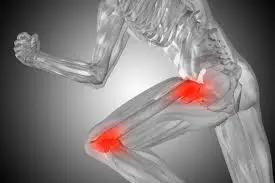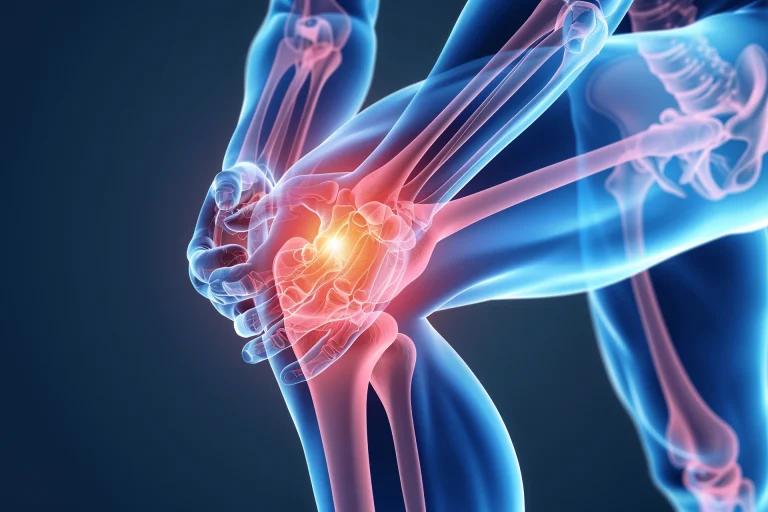Navigating the complex world of joint health supplements can be a daunting task, with conflicting claims and mixed research findings leaving many individuals unsure of their efficacy. As the prevalence of osteoarthritis and other joint-related conditions continues to rise, the demand for effective, natural solutions has never been greater. In this article, we’ll look into the science behind some of the most popular supplements, exploring their potential benefits, limitations, and safety considerations to help you make informed decisions about incorporating them into your healthcare regimen.
The role of glucosamine and chondroitin
Glucosamine and chondroitin sulfate are two of the most widely recognised joint supplements, often touted for their ability to support cartilage health and reduce osteoarthritis symptoms. While the research on their effectiveness has been somewhat mixed, a closer examination reveals nuances that may help guide their use.
Exploring the evidence
The Glucosamine/Chondroitin Arthritis Intervention Trial (GAIT), a landmark study funded by the National Institutes of Health, provided a comprehensive evaluation of these supplements. The initial findings suggested that the combination of glucosamine and chondroitin supplements did not offer significant relief for the general population with knee osteoarthritis. However, a closer look revealed that a subgroup of individuals with moderate-to-severe knee pain experienced notable improvements.
In the years following the GAIT trial, additional studies have yielded more positive results. A 2016 multinational study, the MOVES trial, found the glucosamine-chondroitin combination to be as effective at reducing knee osteoarthritis pain and swelling as the prescription medication celecoxib, without the associated side effects. Another 2015 study even reported that the supplement combination helped slow the progression of joint space narrowing, a key indicator of cartilage degeneration.
Navigating the supplement landscape
The diverse outcomes of these studies can be attributed, in part, to the varying forms and dosages of glucosamine and chondroitin used. Some research suggests that glucosamine sulfate may be more effective than glucosamine hydrochloride, while the combination of the two supplements appears to offer the most promising results.
Ultimately, the evidence seems to favour the use of glucosamine and chondroitin, particularly when taken together, for individuals with osteoarthritis. However, as with any supplement, it’s essential to consult with a healthcare professional to determine the appropriate form, dosage, and duration of use, as well as to monitor for any potential side effects or interactions with other medications.
Harnessing the anti-inflammatory power of omega-3s
Omega-3 fatty acids, found primarily in fish oil, have long been recognised for their potent anti-inflammatory properties, making them a promising option for individuals with various forms of arthritis.
Targeting rheumatoid arthritis
The research on omega-3 supplements for arthritis suggests that they may be particularly beneficial for individuals with rheumatoid arthritis, a condition characterised by chronic inflammation. A 2017 systematic review of studies found that omega-3 supplementation helped reduce joint pain, stiffness, and swelling in individuals with rheumatoid arthritis, potentially allowing them to reduce their reliance on traditional pain medications and their associated side effects.
Potential benefits for osteoarthritis
While the evidence for omega-3s in the management of osteoarthritis is less conclusive, some studies have indicated that these supplements may still offer benefits. By targeting the underlying inflammation that contributes to osteoarthritis, omega-3s may help reduce symptoms and potentially slow the progression of the condition.
Selecting the right supplement
When choosing an omega-3 supplement, it’s essential to look for one that provides a significant amount of the long-chain omega-3 fatty acids, EPA and DHA, as these are the forms that have been shown to provide the most substantial health benefits. Vegans and vegetarians can opt for algae-based supplements to obtain these essential nutrients.
Exploring the therapeutic potential of SAM-e
S-adenosyl-methionine (SAM-e) is another natural compound that has garnered attention for its potential to alleviate arthritis symptoms. This versatile molecule has been studied for its anti-inflammatory, cartilage-protecting, and pain-relieving effects.
Comparing SAM-e to conventional treatments
In studies, SAM-e has demonstrated efficacy comparable to non-steroidal anti-inflammatory drugs (NSAIDs) in relieving the pain associated with osteoarthritis, without the same risk of gastrointestinal side effects. This makes it a potentially appealing alternative for individuals who cannot tolerate or prefer to avoid traditional arthritis medications.
Potential dual benefits
One of the unique aspects of SAM-e is its ability to not only address the physical symptoms of arthritis but also potentially alleviate the emotional burden of the condition. Research suggests that SAM-e may have a mild to moderate antidepressant effect, making it a particularly valuable option for individuals who are also dealing with depression or mood-related challenges alongside their arthritis.
Optimising dosage and timing
When considering SAM-e as a joint health supplement, it’s important to be patient and allow for the full effects to manifest. The typical recommended dosage is 1,200 mg per day, and it may take several weeks to experience the full benefits of this supplement.
Harnessing the anti-inflammatory power of curcumin
Curcumin, the active compound found in the vibrant yellow spice turmeric, has gained significant attention for its potent anti-inflammatory properties and potential applications in the management of arthritis.
Comparing curcumin to conventional treatments
In a study involving 367 individuals with knee osteoarthritis, a daily dose of 1,500 mg of curcumin extract was found to be as effective as 1,200 mg of the non-steroidal anti-inflammatory drug ibuprofen in reducing pain and improving function, without the associated gastrointestinal side effects.
Enhancing bioavailability
One of the key challenges with curcumin is its relatively poor bioavailability, meaning that the body has difficulty absorbing and utilising the compound. To overcome this, it’s important to take curcumin supplements with a source of fat, such as an oil-based formulation, and consider combining it with black pepper extract (piperine), which can significantly enhance its absorption.
Potential benefits for rheumatoid arthritis
In addition to its promising effects on osteoarthritis, curcumin has also shown promise in the management of rheumatoid arthritis. Studies have indicated that it can help reduce swelling and tenderness in individuals with this autoimmune condition, making it a potentially valuable complementary therapy.
The role of vitamins and minerals
While the spotlight often shines on specific joint supplements, it’s important to recognise the potential benefits of various vitamins and minerals in supporting overall joint health.
Antioxidant vitamins
Vitamins A, C, and E are known for their antioxidant properties, which can help combat the oxidative stress and inflammation that contribute to the development and progression of arthritis. While there is currently no strong evidence that supplementing with these vitamins directly improves arthritis symptoms, maintaining a diet rich in these nutrients is generally recommended for overall health.
Vitamin D and bone health
Vitamin D plays a crucial role in bone strength and integrity, making it an important consideration for individuals with joint-related conditions. Supplementation with vitamin D may be particularly beneficial for those who are deficient in this essential nutrient.
Vitamin K and cartilage structure
Vitamin K is involved in the maintenance of cartilage structure, and some research suggests that supplementation with this vitamin may be helpful for individuals with osteoarthritis. However, more extensive studies are needed to fully understand its potential benefits.
Safety considerations and responsible supplementation
While joint health supplements can offer promising benefits, it’s essential to approach their use with caution and under the guidance of healthcare professionals.
Potential interactions and side effects
Many supplements, including those discussed in this article, can interact with certain medications or cause side effects, particularly when taken in high doses. It’s crucial to disclose all supplements you are taking to your healthcare provider to ensure safe and effective use.
Regulatory oversight and quality concerns
Unlike medications, dietary supplements are not subject to the same rigorous approval process by the Food and Drug Administration (FDA). This means that the ingredients listed on the label may not accurately reflect the contents of the product, and there may be variations in quality and potency between different brands and formulations.
Importance of personalised guidance
When incorporating joint health supplements into your routine, it’s essential to work closely with your healthcare provider for medical advice to determine the appropriate form, dosage, and duration of use. They can help you navigate the potential risks, monitor for any adverse effects, and ensure that the supplements are not interfering with any existing medications or conditions.
Conclusion
The world of joint health supplements is complex, with a mix of promising research and lingering uncertainties. By understanding the nuances of the available evidence, you can make informed decisions about incorporating these natural remedies into your overall arthritis management strategy.
Remember, joint supplements should never replace conventional treatments prescribed by your healthcare provider. Instead, view them as complementary tools that, when used responsibly and under medical supervision, may offer additional benefits in reducing symptoms and supporting joint health.
Ultimately, a holistic approach that combines evidence-based supplements, lifestyle modifications, and traditional therapies is the key to unlocking the full potential of joint health management. By empowering yourself with knowledge and working closely with your healthcare team, you can navigate the complex landscape of joint supplements and take a proactive step towards better joint health and quality of life.
Sources
- Glucosamine, Chondroitin for Osteoarthritis Pain | Arthritis Foundation
- Glucosamine – Mayo Clinic
- Glucosamine Chondroitin Supplement: Uses & Side Effects
- Vitamins and Supplements for Arthritis
Medical Disclaimer
NowPatient has taken all reasonable steps to ensure that all material is factually accurate, complete, and current. However, the knowledge and experience of a qualified healthcare professional should always be sought after instead of using the information on this page. Before taking any drug, you should always speak to your doctor or another qualified healthcare provider.
The information provided here about medications is subject to change and is not meant to include all uses, precautions, warnings, directions, drug interactions, allergic reactions, or negative effects. The absence of warnings or other information for a particular medication does not imply that the medication or medication combination is appropriate for all patients or for all possible purposes.










